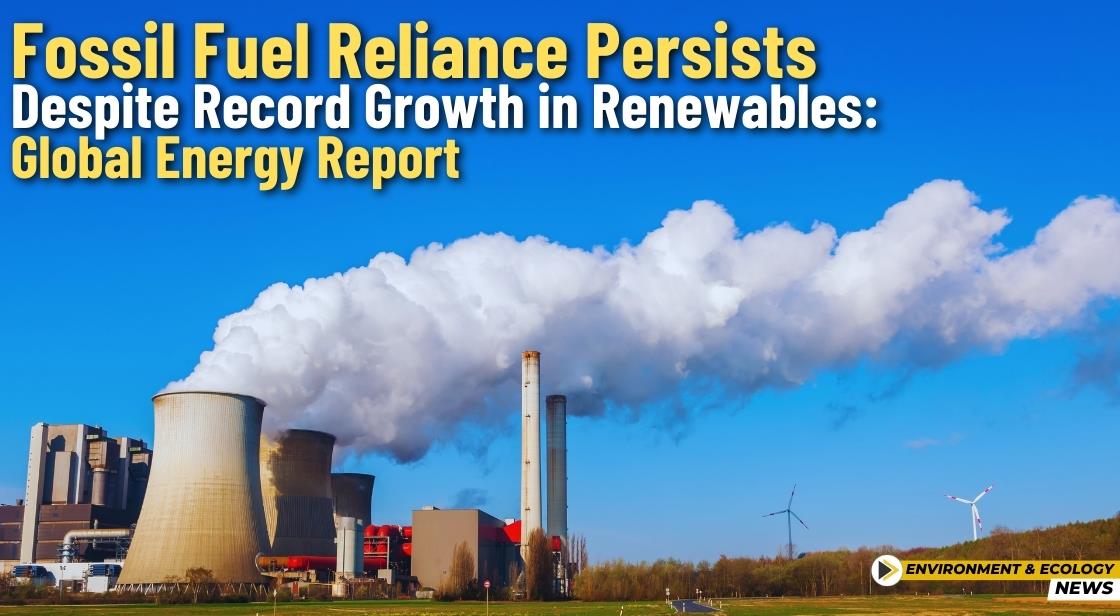Fossil Fuel Reliance Persists Despite Record Growth in Renewables: global energy report

News Synopsis
A new global energy report released in June 2024 paints a concerning picture: fossil fuel consumption reached an all-time high in 2023, even as renewable energy sources like wind and solar power achieved record levels of generation. This highlights the immense challenge the world faces in transitioning away from fossil fuels and curbing greenhouse gas emissions.
Fossil Fuels: A Persistent Challenge
-
Record Consumption and Emissions: The report reveals a global fossil fuel consumption increase of 1.5% in 2023, reaching a staggering 505 exajoules. This surge translates to a troubling rise in energy-related CO2 emissions, exceeding 40 gigatonnes for the first time ever. These figures cast a shadow over previous hopes of a peak in annual emissions by 2023, a critical turning point envisioned by climate scientists.
-
Dominant Energy Source: Despite a significant increase in renewable energy use (wind and solar power generation grew by 13%), fossil fuels maintain their dominance in the global energy mix. A concerning 81.5% of primary energy consumption in 2023 came from fossil fuels, highlighting the continued reliance on these traditional sources.
The report's findings serve as a stark reminder of the urgency for a more rapid transition towards clean energy sources. Delaying this transition will have severe consequences for our planet's climate and future generations.
A Tale of Two Worlds: Developed vs. Developing Economies
The report sheds light on a crucial disparity between developed and developing economies when it comes to energy consumption.
Developed Economies: Signs of Progress, Room for Improvement:
While advanced economies like those in Europe show signs of a potential peak in fossil fuel demand, their reliance on these resources remains significant. Continued efforts to promote energy efficiency and accelerate the adoption of renewable energy solutions are crucial for these economies to achieve a more sustainable energy future.
Developing Economies: Balancing Growth with Sustainability:
Developing nations face a complex challenge. They require reliable and affordable energy sources to fuel economic growth and improve living standards. As a result, many developing economies, like India, continue to rely heavily on coal, oil, and gas. The report highlights this by showcasing India's 8% rise in fossil fuel consumption in 2023, mirroring the overall energy demand increase. This dependence on fossil fuels has led to a situation where India now surpasses Europe and North America combined in terms of coal consumption.
Finding solutions that enable developing economies to achieve sustainable growth while transitioning away from fossil fuels is paramount. This will require international cooperation, technological advancements in clean energy technologies, and financial assistance to support developing nations in their clean energy endeavors.
Europe Charts a Different Course
Europe provides a glimmer of hope in the report. Driven by a decline in energy demand and a significant shift towards renewable energy sources, fossil fuels dipped below 70% of primary energy use for the first time since the Industrial Revolution. This progress is a testament to the effectiveness of implementing strong policies that promote energy efficiency and renewable energy development.
-
A Decline in Gas Dependence: Notably, Europe's gas demand has witnessed a sharp decline since Russia's invasion of Ukraine in 2022, leading to a collapse in pipeline gas imports. This geopolitical event, coupled with a focus on energy security, has accelerated Europe's shift away from Russian gas and towards alternative sources. The report reflects this trend with a 7% drop in overall gas demand in 2023, following a 13% decrease the previous year.
Europe's success story exemplifies the potential for significant progress in transitioning away from fossil fuels. However, it is crucial to acknowledge the specific circumstances that enabled Europe's progress, such as a developed economy and access to advanced technologies.
Conclusion
The 2024 global energy report serves as a wake-up call. While growth in renewable energy is encouraging, the continued dominance of fossil fuels presents a significant challenge in the fight against climate change. Addressing this challenge requires a multi-pronged approach that includes:
-
Accelerating the development and deployment of clean energy technologies.
-
Implementing strong policies that incentivize the transition to clean energy.
-
Providing financial and technological assistance to developing economies to support their clean energy journeys.
-
Promoting energy efficiency measures to reduce overall energy demand.
By taking decisive action, we can create a more sustainable energy future for all.
You May Like









